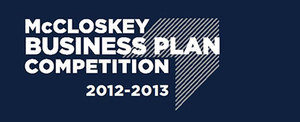Ideas Challenge 2012: From cancer drugs to neckties
Published: October 30, 2012 / Author: Ed Cohen

A cancer vaccine for dogs.
A smart-phone app that lets you use your phone’s camera to
search for words on the printed page the way Control-F does with text on a
computer.
A way to detect dangerous, counterfeit pharmaceuticals by
rubbing a suspect pill over a piece of specially coated paper.
Those were some of the more popular business ideas pitched
by students at this fall’s Ideas Challenge, the kick-off event of the annual
McCloskey Business Plan Competition.
Held October 9 in the packed-out Giovanini Commons located in the lower
level of the Mendoza College of Business, the challenge saw more than 60
elevator-type pitches in the course of the evening. Winners were selected by audience vote using
text messaging.
As innovative as the canine cancer vaccine, word-search app
and counterfeit drug detector were, the pitches didn’t in fact win the Ideas
Challenge. That honor, and an Apple iPad prize, went to ESTEEM program student
Shane McCarthy from Ireland, who proposed harvesting bio-gas (produced by the
breakdown of organic matter) from dining-hall food waste and campus grass
clippings and using the gas to power campus kitchens.
The Ideas Challenge is designed to encourage participation in the
Gigot Center for Entrepreneurship’s McCloskey Business Plan Competition, held each spring. The
energy and enthusiasm of the crowd, as well as the broad range of ideas
presented in rapid-fire fashion, were good signs that the year-long McCloskey
Competition will have a strong field of contenders when it ultimately declares
the winners during the final event on April 19.
Now in its 13th year, the McCloskey Business Plan
competition is for both for-profit and not-for-profit ventures that have not been launched or are in the earliest
stages of launch.
“It’s not too late to
enter,” said Karen Slaggert, associate director for the Gigot Center. “For the
first round, alumni simply need to submit a two-page overview that describes
the business concept in general, the target customers, industry overview,
competitive landscape and revenue potential. The overview is intended to be a
summary, not a detailed business plan.
“If you have a good idea for a business venture, I encourage
you to take this first step toward making it a reality. Everyone who enters
wins in the sense of the valuable advice, mentoring, networking and feedback
they gain from the experience.”
To participate, each team must include at least one full-time
Notre Dame student, faculty member or alumnus/alumna.
“Thanks to the generosity of our benefactors and sponsors, we are able to offer total prizing of nearly $300,000 this year,” said Slaggert. This includes the $25,000 McCloskey Grand Prize, the $15,000
Klau Family Prize for Greatest Social Impact and other smaller cash
awards, as well as in-kind prizes for legal, patent and consulting
services, among other benefits.
Back at the Ideas Challenge, the next three highest vote-getters
after McCarthy also received iPads. That group included finance major Andrew
Charnesky’s proposal for a line of men’s ties with a social purpose. Profits
from the sale of EmPower Ties, he said, would be used to help fund efforts to
teach people in Africa how to start their own businesses.
The cancer vaccine for dogs won a special $75 prize as the best
health-care idea. It was pitched by Ashley Kalinauskas, another ESTEEM student,
who told the crowd the vaccine relied on patented technology being studied at
Notre Dame.
For more information about the McCloskey Business Plan Competition, including detailed guidelines on writing and submitting the
overview to enter the competition, visit the Gigot website or contact Karen
Slaggert via email at kslagger@nd.edu or
by telephone at (574) 631-2714.
/news_and_events/news_articles/article/12118/ideas-challenge-2012-from-cancer-drugs-to-neckties




